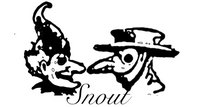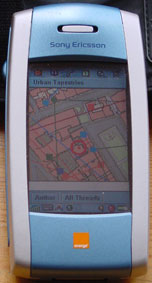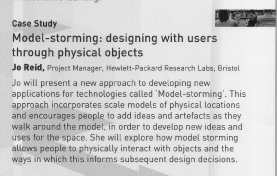
Snout is a new collaboration between inIVA, Proboscis and researchers from Birkbeck College exploring relationships between the body, community and the environment. It builds on our previous collaboration on Feral Robots (with Natalie Jeremijenko) to investigate how data can be collected from environmental sensors as part of popular social and cultural activities.
Snout will create two prototype sensor wearables based on traditional carnival costumes. Carnival is a time of suspension of the normal activities of everyday life – a time when the fool becomes king for a day, when social hierarchies are inverted, a time when everyone is equal. There is no audience at a carnival, only carnival-goers. Snout proposes 'participatory sensing' as a lively addition to the popular artform of carnival costume design, engaging the community in an investigation of its own environment, something usually done by local authorities and state agencies.
A public forum on 'participatory sensing and media scavenging' will be held in London in Spring 2007 to demonstrate the Snout wearables, discuss evidence collecting for environmental action and how communities can reflect on the personal impact of pollution and the environment.
Proboscis and Birkbeck College Computer Science Dept have been slowly cooking up a collaboration over the past 18 months. Two PhD students have become closely invloved in developing the Urban Tapetries software platform and we are collaborating closely on the final stages of the Feral Robotic Public Authoring project to build some new sensor and location sensing platforms to communicate environmental data back to UT.
Sensory Threads is the title of a project that was shortlisted for a 2005 Wellcome Trust Sciart Award. We are now exploring other funding avenues and partnerships and hope to kick the project off in early 2006. Sensory Threads aims to stimulate and inform a public debate on how personal biosensor data is collected and used in biomedical science. It will combine an artistic with an evidence-based approach, building and testing a prototype body biosensor network that uploads data to Urban Tapestries. This will allow participants to map experiential and emotional annotations to their readings – adding a whole new layer of sentient knowledge to machine data. It is intended to demystify how data is collected, what it produces and how we can correlate it to other factors affecting health such as environmental pollution.
We've been graced by the presence of Natalie Jeremijenko this past week as she begins her EPSRC Visiting Fellowship with Proboscis. Our plan is to investigate the potential of bridging her Feral Robotic experiments with Urban Tapestries to create new opportunities for social engagement around issues of local pollution and envirnmental issues.
In addition to our own technical, operational and contextual discussions we've also had discussions with Space Studios and the London Knowledge Lab about collaborating on sites, community engagement and learning research, all generating much excitement and opportunity for a broad set of outcomes to emerge.
The Fellowship/Collaborations will build towards a public event in the late Summer where we hope to release some robots into a public space in partnership with local people.
Earlier this summer we received confirmation of an award from the Engineering & Physical Research Council (EPSRC) for a Visiting Fellowship by artist and engineer, Natalie Jeremijenko.
During the fellowship we plan to develop interfaces between reconfigured robot dogs and Urban Tapestries for hobbyists to turn consumer toys into tools for social activism – adding new sensors to detect environmental pollution and map it via UT. The aim of the research is to develop and demonstrate possibilities for people to adapt technologies for their own benefit, taking emerging technologies (like UT) and combining them with grass roots hobbyist practices for social and cultural ends.
We are very excited to be one of the first arts-based organisations to be funded by the EPSRC under its new Culture and Creativity scheme.
(30/9/2004) In fact it appears from the EPSRC's funded organisations list that Proboscis is the first such organisation (that isn't an education organisation) to be awarded funding by them.
Nick & I participated in the Creative Crossings Seminar at the Finnish Institute in London on Monday and Tuesday. It was organised by m-cult, banff centre and arts council england to bring together practitioners from Britain, Canada and Finland with an aim of exploring key research criteria and how to build transnational networks of collaboration.
I was asked by one of the organisers, Minna Tarka, to make some opening remarks on the theme of 'location, locatedness and locative media' to stimulate the first day's debate with Marc Tuters of the Locative Media Network.
The two days were framed by intensive discussions and debates around concepts of sharing and openness, place and location, culture and society, practice and ideology. Anne Galloway has an excellent summary here.
John and I visited Helsinki to discuss specifications and possibilities for running a special Urban Tapestries as part of isea2004. Our aim was to explore the city and set up some dialogues to inspire the user scenarios we'll be designing as part of the experience.
Our hosts – Tapio, Hanna, Minna and Amanda – were wonderful and introduced us to some great aspects of the city, some of its exciting inhabitants, as well as the culinary delights! We returned armed with stunning treats and notebooks full of ideas for creating an Urban Tapestry that should be able to get at the nub of the city.
We also visited Nokia Research Centre (courtesy of Matt Jones) to present UT and discover more about Nokia's mupe project.

Nick and I attended a talk and 'boot camp' on Place Lab at Intel Research Cambridge last Thursday, given by Anthony LaMarca of Intel Research Seattle. We were impressed with the vision and the software and hope to develop a collaboration with the PlaceLab team to integrate it into future versions of Urban Tapestries.
"Place Lab is an endeavor to enable a privacy-observant, planetary-scale positioning system that builds upon the increasing proliferation of 802.11 WiFi coverage in metropolitan areas as well as other cellular networking technologies. Unlike previous location systems, Place Lab is explicitly designed to be privacy-conscious and to work both indoors and outdoors without requiring significant deployment of customized hardware. A Place Lab client determines its location by passively listening for beacons emitted by 802.11 or other cellular access points and comparing them to (a cached copy of) a global location database which maps access point identifiers to latitude and longitude.
"Place Lab is an open, collaborative research project and has participants from Intel, University of Washington, University of California at San Diego, and elsewhere. We will discuss the Place Lab research agenda, describe the Place Lab toolkit and show a demonstration of the system at work. For more information visit www.placelab.org."
On Thursday Nick and I presented our work on Urban Tapestries to a group of researchers and geographers at the Ordnance Survey. We had some very encouraging conversations and discussions with them about the future potential for public authoring and collaborative cartography systems, and how the Research and Innovation group at OS are keen to find ways to interact with researchers and developers working in this area.
Their enthusiasm for finding new collaborative research models and ways to devise prototypes and tests that engage with the public is very inspiring and helps shift the traditional perception of the OS as a monolithic and impenetrable organisation that is only interested in licensing their data to large corporations. We are looking forward to an ongoing and fruitful collaboration with them on Urban Tapestries.
Yesterday we had a key development meeting between us, Orange and France Telecom R&D. We outlined the main areas of enhancement from the original prototype on the iPaq and decided on a rough target of completing version 1.1 for the P800 mobile phone by mid April. We plan to run a second trial in late April where a small group will be given devices to use over 1-2 weeks to give us a more realistic idea of why, what and how people will use public authoring over time.
Meantime FTR&D have managed to resolve a few of our Symbian/XMLRPC problems and managed to get a version of the current 1.0 prototype working across GPRS. Hurrah!

Proof that industry can directly benefit from working with artists by learning new processes and methodologies that can be directly translated into their own practices:

Our partners at HP Labs have profited from taking part in our Bodystorming Experiences – adopting the model for use in their own projects. Jo Reid will be presenting their version (Modelstorming) at NESTA futurelab's Digital Dialogues Event, Sheffield 24-25 March 2004.
A new year beckons and its time to reflect back on the previous year's activities and peer ahead into the future. After a few weeks' welcome break we're now in the process of evaluating what we learned from the trial and planning the next stages of development: both of the Urban Tapestries platform (software) and of the social, cultural, economic and political uses of public authoring. We will be drawing out key themes from the trial and creating a section on this blog as a discussion forum exploring these issues and their implications.
We are continuing to develop the client software for the P800 mobile phone with France Telecom R&D, and extending and refining the server-side elements, hopefully to run a small trial of the P800 version in the Spring. Now we have the basics of a system that works, we are also starting to prepare a development roadmap for functionality: planning key stages in which to add more and more enhancements.
Beginning in April we will also be starting the next major research phase under the title 'Social Tapestries: Public Authoring and Civil Society'. In parallel with our technical development of the Urban Tapestries software, we are putting together a consortium of partners to explore specific uses of public authoring technologies in civil society contexts – collaborating on experiments to explore why people may use these technologies, what they will do with them, as well as how they can be delivered.
A Cultural Snapshot exploring this area of research will be published by Proboscis in the near future.
France Telecom R&D has joined Urban Tapestries as a project collaborator. They are working with us and Orange to build the client application for the SonyEricsson P800 mobile for the December Trial.
They join Ordnance Survey and Locustworld as project collaborators, whilst the main partners remain Proboscis, London School of Economics, Hewlett Packard Research Labs and Orange.
FT R&D website